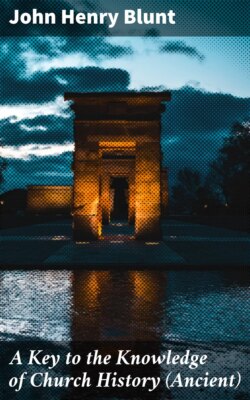Читать книгу A Key to the Knowledge of Church History (Ancient) - John Henry Blunt - Страница 13
На сайте Литреса книга снята с продажи.
Section 8. The Martyrdom of St. Stephen.
ОглавлениеTable of Contents
A.D. 34. The Seven Deacons.
St. Stephen, the foremost and saintliest of the Seven Deacons, and St. Philip, the second in order, are the only two of whom we have any further mention in the Book of Acts; but it is believed that the last named, Nicolas of Antioch, was the author of the heresy of the Nicolaitanes, which our Blessed Lord twice over tells us that He hates[41]. Nicolas seems in this way to be a sad reflection of the awful example set by the traitor Judas, the last reckoned Apostle.
Their functions.
It is clear that the ministrations of the first Deacons were not of necessity confined to the "serving of tables," which was the primary occasion of their appointment. St. Philip both preached and baptized[42]; and St. Stephen brought down upon himself the hatred and malice of the Jews by the boldness and power of his preaching. Both preaching and baptizing do still, under certain restrictions, "appertain to the office of a Deacon[43]."
Probably all Hellenists.
Judging from the names of the Seven Deacons, there seems good reason for supposing that they were all or most of them Grecians or Hellenists. St. Stephen was undoubtedly a Hellenist, and his early training made him a ready instrument for the work to which the Holy Ghost had called him. Freed by education from many of the associations and feelings which bound his Hebrew brethren to the Holy City and the Temple, he could realize more plainly than they could do, the future of the Christian Church apart from both these, and boldly proclaimed his convictions. St. Stephen's preaching rouses Hebrew prejudices. By this conduct he aroused all the deeply-rooted prejudices and exclusive pride of the Jewish mind, even amongst those who, like himself, were Hellenists, and to whom he seems more particularly to have addressed himself. Up to this time, what opposition there was to the teaching of the Apostles, seems to have come chiefly from the unbelieving sect of the Sadducees[44]; for the people had espoused the cause of the Christian teachers[45], and the Pharisees had advocated lenient conduct towards those who confessed, as they themselves did, a belief in the Resurrection[46]. The Pharisees join with the Saducees in opposition to the Church. But now all was altered; priests and people, Sadducees and Pharisees, were alike vehement against those who ventured to assert that the "Holy Place and the Law" should ever give way to a Holier than they; and foremost amongst the persecutors was the fiery, earnest, intellectual man who was afterwards the holy Apostle Paul[47].
St. Stephen's speech a direct Inspiration.
The defence of the heavenly-minded Deacon before his malicious and bloodthirsty enemies must be looked upon as a direct Inspiration of the Holy Ghost, a fulfilment of our Blessed Lord's promise to His Church[48], and a Divine commentary on Old Testament History, showing that God's mercies were not restrained to any particular place or country, and upbraiding the Jews with their abuse of their many privileges and their rejection of the Saviour. But the words of this first Christian "Apology against Judaism" fell for the time on unheeding ears; and its only present apparent result was the violent and yet triumphant death of him who had been chosen to utter it. His blessed martyrdom. Beneath the stoning of the enraged multitude, the First Martyr "fell asleep," blessed in his last moments with a foretaste of the Beatific Vision[49].
